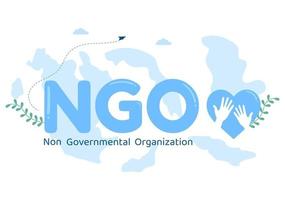
Introduction
Non-Governmental Organizations (NGOs) have emerged as powerful catalysts for positive change across the globe. These organizations work tirelessly to address a wide spectrum of social, economic, and environmental issues. While the passion and dedication of individuals behind NGOs are commendable, formal registration holds a vital role in amplifying their impact. In this blog, we delve into why NGO registration is crucial, shedding light on the benefits it brings to both organizations and the communities they serve.
- Legal Recognition and Credibility
One of the primary reasons for NGO registration is gaining legal recognition. When an NGO is officially registered with the appropriate government authority, it acquires a legal status that reinforces its authenticity and credibility. This recognition not only enhances the organization’s reputation but also instills trust among potential donors, partners, and beneficiaries.
- Access to Funding Opportunities
NGO registration opens doors to a variety of funding opportunities that may otherwise remain inaccessible. Many governmental and non-governmental entities, as well as philanthropic foundations, require NGOs to be registered before they can apply for grants or funding. Registration is often a prerequisite for eligibility, as it demonstrates the organization’s commitment to transparency and accountability.
- Tax Benefits and Exemptions
Registered NGOs can enjoy certain tax benefits and exemptions, which can significantly impact their financial sustainability. These benefits vary from country to country and can include tax deductions for donors, exemptions from income tax, and customs duty waivers on imports for charitable purposes. Such advantages enable NGOs to allocate more resources towards their projects and initiatives.
- Enhanced Outreach and Impact
Formal registration facilitates increased visibility and exposure for NGOs. It allows them to operate with a sense of legitimacy that draws in more volunteers, supporters, and collaborators. This wider network amplifies an NGO’s outreach efforts, ultimately translating into a broader and deeper impact within communities.
- Accountability and Transparency
NGO registration comes hand in hand with increased accountability and transparency. Regulatory authorities typically require registered NGOs to adhere to specific reporting and governance standards. These standards ensure that organizations operate ethically, utilize funds responsibly, and fulfill their stated objectives. By upholding these standards, NGOs build stronger relationships with stakeholders and uphold the public’s trust.
- Long-Term Sustainability
A registered NGO is better positioned for long-term sustainability. The formal structure and governance established during registration provide a solid foundation for effective management and growth. This stability is attractive to donors and partners who seek to invest in organizations that have a lasting impact and can weather the challenges of the future.
Conclusion
NGO registration is more than just a bureaucratic process; it’s a strategic move that can unlock a multitude of benefits for organizations committed to making a positive difference. Beyond the legal recognition and credibility it bestows, registration opens avenues for funding, tax benefits, and enhanced visibility. It lays the groundwork for greater accountability and transparency, ensuring that NGOs uphold their missions with integrity. Moreover, by securing their long-term sustainability, registered NGOs can continue to champion causes, create change, and leave a lasting imprint on the world. So, if you’re nurturing an aspiration to transform lives and bring about positive transformation, consider taking that pivotal step of registering your NGO – it’s an investment in impact that resonates far beyond the paperwork.
